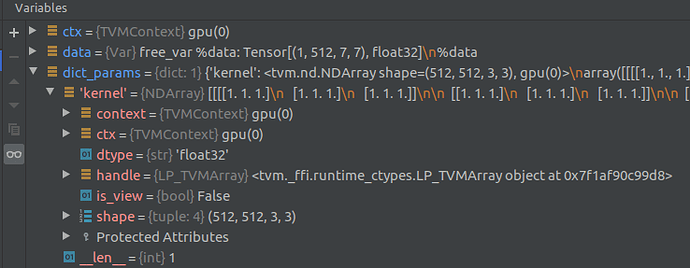I am trying to use the templates which are implemented by tvm to tune single operators. I use the code mentioned in this discussion. The code is:
import os
import numpy as np
import tvm
from tvm import te
from tvm import autotvm
from tvm import relay
import tvm.relay.testing
from tvm.autotvm.tuner import XGBTuner, GATuner, RandomTuner, GridSearchTuner
from tvm.contrib.util import tempdir
import tvm.contrib.graph_runtime as runtime
target = tvm.target.cuda()
N, H, W, CO, CI, KH, KW, strides, padding = 1, 7, 7, 512, 512, 3, 3, (1, 1), (1, 1)
data = te.placeholder((N, CI, H, W), name='data')
kernel = te.placeholder((CO, CI, KH, KW), name='kernel')
dilation=1
dtype = "float32"
kernel_shape = (CO, CI, KH, KW)
ctx = tvm.gpu()
out = relay.nn.conv2d(data, kernel, strides=strides, padding=padding, dilation=dilation, channels = CO, kernel_size = (KH, KW), data_layout='NCHW',out_layout='NCHW', out_dtype=dtype)
mod = relay.Module.from_expr(out)
kernel_weights = tvm.nd.array(np.ones(kernel_shape, dtype=dtype), ctx)
dict_params = {'kernel': kernel_weights}
task = autotvm.task.extract_from_program(mod["main"], target=target, params=dict_params, ops=(relay.op.nn.conv2d,))
The output is:
Traceback (most recent call last):
File "tune_single_op_builtin_tmp.py", line 25, in <module>
out = relay.nn.conv2d(data, kernel, strides=strides, padding=padding, dilation=dilation, channels = CO, kernel_size = (KH, KW), data_layout='NCHW',out_layout='NCHW', out_dtype=dtype)
File "/usr/tvm/python/tvm/relay/op/nn/nn.py", line 209, in conv2d
kernel_layout, out_layout, out_dtype)
File "/usr/tvm/python/tvm/_ffi/_ctypes/packed_func.py", line 213, in __call__
raise get_last_ffi_error()
tvm._ffi.base.TVMError: Traceback (most recent call last):
[bt] (3) /usr/tvm/build/libtvm.so(TVMFuncCall+0x65) [0x7fe8d57fab85]
[bt] (2) /usr/tvm/build/libtvm.so(+0x7f1898) [0x7fe8d53d6898]
[bt] (1) /usr/tvm/build/libtvm.so(tvm::RelayExpr tvm::runtime::TVMPODValue_::AsObjectRef<tvm::RelayExpr>() const+0x14b) [0x7fe8d4fd7d5b]
[bt] (0) /usr/tvm/build/libtvm.so(dmlc::LogMessageFatal::~LogMessageFatal()+0x43) [0x7fe8d4f75d63]
File "/usr/tvm/include/tvm/runtime/packed_func.h", line 1456
TVMError: Check failed: ObjectTypeChecker<TObjectRef>: :Check(ptr): Expect relay.Expr but get Tensor
Can anyone help on this?



